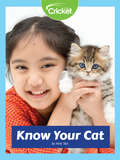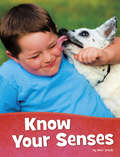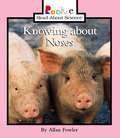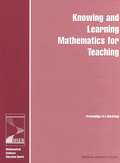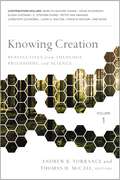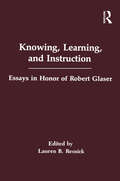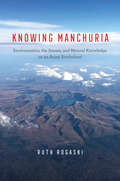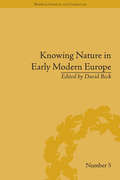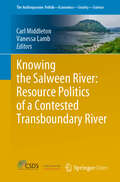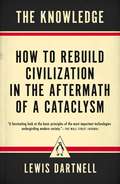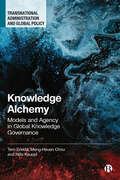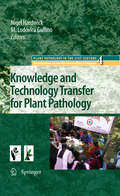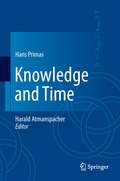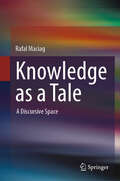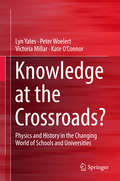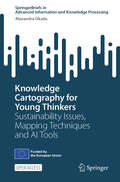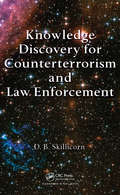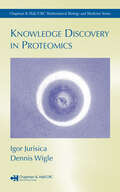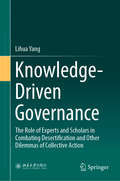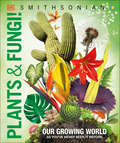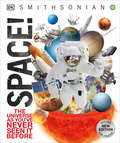- Table View
- List View
Know Your Cat
by Amy TaoCats are amazing creatures! They have a lot of senses that make the way they see, hear, and smell very different from humans. Do you know the differences between cat and human senses?
Know Your Senses (Health and My Body)
by Mari SchuhYour five senses help make every day complete. From smelling and tasting breakfast to feeling soft sheets when you climb into bed, your senses play a big part in your life. Descriptive text and energetic photos highlight the importance of taste, touch, sight, smell, and hearing. Know Your Senses includes a glossary, a read more section, kid-friendly Internet sites, and an index.
Knowing about Noses
by Allan FowlerFrom friendly dolphins to giant pandas, from icebergs and glaciers to energy from the sun, from magnets to solids, liquids, and gases, Rookie Read-About Science is a natural addition to the primary-grade classroom with books that cover every part of the science curricula. Includes: animals, nature, scientific principles, the environment, weather, and much more!
Knowing and Learning Mathematics for Teaching
by Mathematics Teacher Preparation Content Workshop Program Steering CommitteeThere are many questions about the mathematical preparation teachers need. Recent recommendations from a variety of sources state that reforming teacher preparation in postsecondary institutions is central in providing quality mathematics education to all students. The Mathematics Teacher Preparation Content Workshop examined this problem by considering two central questions: What is the mathematical knowledge teachers need to know in order to teach well? How can teachers develop the mathematical knowledge they need to teach well? The Workshop activities focused on using actual acts of teaching such as examining student work, designing tasks, or posing questions, as a medium for teacher learning. The Workshop proceedings, Knowing and Learning Mathematics for Teaching, is a collection of the papers presented, the activities, and plenary sessions that took place.
Knowing Creation: Perspectives from Theology, Philosophy, and Science
by Thomas H. McCall Andrew B. TorranceIt is hard to think of an area of Christian theology that provides more scope for interdisciplinary conversation than the doctrine of creation. This doctrine not only invites reflection on an intellectual concept: it calls for contemplation of the endlessly complex, dynamic, and fascinating world that human being inhabit. But the possibilities for wide-ranging discussion are such that scholars sometimes end up talking past one another. Productive conversation requires mutual understanding of insights across disciplinary boundaries. Knowing Creation offers an essential resource for helping scholars from a range of fields to appreciate one another's concerns and perspectives. In so doing, it offers an important step forward in establishing a mutually-enriching dialogue that addresses, amongst others, the following key questions:Who is the God who creates?Why does God create?What is "creation"?What does it mean to recognize that a theology of creation speaks of a natural world that is subject to the observation of the natural sciences? What does it mean to talk about both a "natural" order and a "created" order?What are the major tensions that have arisen between the natural sciences and Christian thinking historically, and why? How can we move beyond such tensions to a positive and constructive conversation, while also avoiding facile notions such as a "god of the gaps"?Is it feasible for a natural scientist to maintain a belief in God's continuing creative activity?In what ways might a naturalistic understanding of the natural world be said to be limited?How can biblical studies, theology, philosophy, history, and science talk better together about these questions?At a time when the doctrine of creation - and even a mention of "creation" - has been disparaged due to its supposed associations with anti-scientific dogma, and theological offerings sometimes risk appearing a little more than reactionary exercises in naive apologetics, ill-informed by science or distinctly wary of engagement with it, it is more important than ever to offer a cross-disciplinary resource that can voice a positive account of a Christian theology of creation, and do so as a genuinely broad-ranging conversation about science and faith.Contributors to Knowing Creation include Marilyn McCord Adams, Denis Alexander, Susan Eastman, C. Stephen Evans, Peter van Inwagen, Christoph Schwobel, John H. Walton, Francis Watson, and more.X
Knowing, Learning, and instruction: Essays in Honor of Robert Glaser (Psychology of Education and Instruction Series)
by Lauren B. ResnickCelebrating the 20th anniversary of the Learning Research and Development Center (LRDC) at the University of Pittsburgh, these papers present the most current and innovative research on cognition and instruction. Knowing, Learning, and Instruction pays homage to Robert Glaser, founder of the LRDC, and includes debates and discussions about issues of fundamental importance to the cognitive science of instruction.
Knowing Manchuria: Environments, the Senses, and Natural Knowledge on an Asian Borderland
by Ruth RogaskiMaking sense of nature in one of the world’s most contested borderlands. According to Chinese government reports, hundreds of plague-infected rodents fell from the skies over Gannan county on an April night in 1952. Chinese scientists determined that these flying voles were not native to the region, but were vectors of germ warfare, dispatched over the border by agents of imperialism. Mastery of biology had become a way to claim political mastery over a remote frontier. Beginning with this bizarre incident from the Korean War, Knowing Manchuria places the creation of knowledge about nature at the center of our understanding of a little-known but historically important Asian landscape. At the intersection of China, Russia, Korea, and Mongolia, Manchuria is known as a site of war and environmental extremes, where projects of political control intersected with projects designed to make sense of Manchuria’s multiple environments. Covering more than 500,000 square miles, Manchuria’s landscapes include temperate rainforests, deserts, prairies, cultivated plains, wetlands, and Siberian taiga. With analysis spanning the seventeenth century to the present day, Ruth Rogaski reveals how an array of historical actors—Chinese poets, Manchu shamans, Russian botanists, Korean mathematicians, Japanese bacteriologists, American paleontologists, and indigenous hunters—made sense of the Manchurian frontier. She uncovers how natural knowledge, and thus the nature of Manchuria itself, changed over time, from a sacred “land where the dragon arose” to a global epicenter of contagious disease; from a tragic “wasteland” to an abundant granary that nurtured the hope of a nation.
Knowing Manchuria: Environments, the Senses, and Natural Knowledge on an Asian Borderland
by Ruth RogaskiMaking sense of nature in one of the world’s most contested borderlands. According to Chinese government reports, hundreds of plague-infected rodents fell from the skies over Gannan county on an April night in 1952. Chinese scientists determined that these flying voles were not native to the region, but were vectors of germ warfare, dispatched over the border by agents of imperialism. Mastery of biology had become a way to claim political mastery over a remote frontier. Beginning with this bizarre incident from the Korean War, Knowing Manchuria places the creation of knowledge about nature at the center of our understanding of a little-known but historically important Asian landscape. At the intersection of China, Russia, Korea, and Mongolia, Manchuria is known as a site of war and environmental extremes, where projects of political control intersected with projects designed to make sense of Manchuria’s multiple environments. Covering more than 500,000 square miles, Manchuria’s landscapes include temperate rainforests, deserts, prairies, cultivated plains, wetlands, and Siberian taiga. With analysis spanning the seventeenth century to the present day, Ruth Rogaski reveals how an array of historical actors—Chinese poets, Manchu shamans, Russian botanists, Korean mathematicians, Japanese bacteriologists, American paleontologists, and indigenous hunters—made sense of the Manchurian frontier. She uncovers how natural knowledge, and thus the nature of Manchuria itself, changed over time, from a sacred “land where the dragon arose” to a global epicenter of contagious disease; from a tragic “wasteland” to an abundant granary that nurtured the hope of a nation.
Knowing Nature in Early Modern Europe (Warwick Series in the Humanities #5)
by David BeckToday we are used to clear divisions between science and the arts. But early modern thinkers had no such distinctions, with ‘knowledge’ being a truly interdisciplinary pursuit. Each chapter of this collection presents a case study from a different area of knowledge.
Knowing the Salween River: Resource Politics of a Contested Transboundary River (The Anthropocene: Politik—Economics—Society—Science #27)
by Carl Middleton Vanessa LambThis open access book focuses on the Salween River, shared by China, Myanmar, and Thailand, that is increasingly at the heart of pressing regional development debates. The basin supports the livelihoods of over 10 million people, and within it there is great socio-economic, cultural and political diversity. The basin is witnessing intensifying dynamics of resource extraction, alongside large dam construction, conservation and development intervention, that is unfolding within a complex terrain of local, national and transnational governance. With a focus on the contested politics of water and associated resources in the Salween basin, this book offers a collection of empirical case studies that highlights local knowledge and perspectives. Given the paucity of grounded social science studies in this contested basin, this book provides conceptual insights at the intersection of resource governance, development, and politics of knowledge relevant to researchers, policy-makers and practitioners at a time when rapid change is underway.- Fills a significant knowledge gap on a major river in Southeast Asia, with empirical and conceptual contributions- Inter-disciplinary perspective and by a range of writers, including academics, policy-makers and civil society researchers, the majority from within Southeast Asia- New policy insights on a river at the cross-roads of a major political and development transition
The Knowledge
by Lewis DartnellHow would you go about rebuilding a technological society from scratch?If our technological society collapsed tomorrow, perhaps from a viral pandemic or catastrophic asteroid impact, what would be the one book you would want to press into the hands of the postapocalyptic survivors? What crucial knowledge would they need to survive in the immediate aftermath and to rebuild civilization as quickly as possible--a guide for rebooting the world?Human knowledge is collective, distributed across the population. It has built on itself for centuries, becoming vast and increasingly specialized. Most of us are ignorant about the fundamental principles of the civilization that supports us, happily utilizing the latest--or even the most basic--technology without having the slightest idea of why it works or how it came to be. If you had to go back to absolute basics, like some sort of postcataclysmic Robinson Crusoe, would you know how to re-create an internal combustion engine, put together a microscope, get metals out of rock, accurately tell time, weave fibers into clothing, or even how to produce food for yourself?Regarded as one of the brightest young scientists of his generation, Lewis Dartnell proposes that the key to preserving civilization in an apocalyptic scenario is to provide a quickstart guide, adapted to cataclysmic circumstances. The Knowledge describes many of the modern technologies we employ, but first it explains the fundamentals upon which they are built. Every piece of technology rests on an enormous support network of other technologies, all interlinked and mutually dependent. You can't hope to build a radio, for example, without understanding how to acquire the raw materials it requires, as well as generate the electricity needed to run it. But Dartnell doesn't just provide specific information for starting over; he also reveals the greatest invention of them all--the phenomenal knowledge-generating machine that is the scientific method itself. This would allow survivors to learn technological advances not explicitly explored in The Knowledge as well as things we have yet to discover.The Knowledge is a brilliantly original guide to the fundamentals of science and how it built our modern world as well as a thought experiment about the very idea of scientific knowledge itself.
The Knowledge
by Lewis DartnellHow would you go about rebuilding a technological society from scratch? If our technological society collapsed tomorrow, perhaps from a viral pandemic or catastrophic asteroid impact, what would be the one book you would want to press into the hands of the postapocalyptic survivors? What crucial knowledge would they need to survive in the immediate aftermath and to rebuild civilization as quickly as possible--a guide for rebooting the world? Human knowledge is collective, distributed across the population. It has built on itself for centuries, becoming vast and increasingly specialized. Most of us are ignorant about the fundamental principles of the civilization that supports us, happily utilizing the latest--or even the most basic--technology without having the slightest idea of why it works or how it came to be. If you had to go back to absolute basics, like some sort of postcataclysmic Robinson Crusoe, would you know how to re-create an internal combustion engine, put together a microscope, get metals out of rock, accurately tell time, weave fibers into clothing, or even how to produce food for yourself? Regarded as one of the brightest young scientists of his generation, Lewis Dartnell proposes that the key to preserving civilization in an apocalyptic scenario is to provide a quickstart guide, adapted to cataclysmic circumstances. The Knowledge describes many of the modern technologies we employ, but first it explains the fundamentals upon which they are built. Every piece of technology rests on an enormous support network of other technologies, all interlinked and mutually dependent. You can't hope to build a radio, for example, without understanding how to acquire the raw materials it requires, as well as generate the electricity needed to run it. But Dartnell doesn't just provide specific information for starting over; he also reveals the greatest invention of them all--the phenomenal knowledge-generating machine that is the scientific method itself. This would allow survivors to learn technological advances not explicitly explored in The Knowledge as well as things we have yet to discover. The Knowledge is a brilliantly original guide to the fundamentals of science and how it built our modern world as well as a thought experiment about the very idea of scientific knowledge itself.
Knowledge Alchemy: Models and Agency in Global Knowledge Governance (Transnational Administration and Global Policy)
by Tero Erkkilä Meng-Hsuan Chou Niilo KauppiThis book introduces the concept of ‘knowledge alchemy’ to capture the generic process of transforming mundane practices and policies of governance into competitive ones following imagined global gold standards. Using examples from North America, Europe and Asia, it explores how knowledge alchemy increasingly informs national and institutional policies and practices on economic performance, higher education, research and innovation. The book examines how governments around the world have embraced global models of world-class university, human capital and talent competition as essential in ensuring national competitiveness. Through its analysis, the book shows how this strongly future-oriented and anticipatory knowledge governance is steered by a surge of global classifications, rankings and indicators, resulting in numerous comparisons of various domains that today form more constraining global policy scripts.
Knowledge And Mind: A Philosophical Introduction
by Andrew Brook Robert J. StaintonThis is the only contemporary text to cover both epistemology and philosophy of the mind at an introductory level.
Knowledge and Technology Transfer for Plant Pathology
by Nigel Hardwick Maria Lodovica GullinoThis book contains fuller versions of the papers and posters presented in the Knowledge and Technology Transfer and Teaching Plant Pathology sessions at the 9th International Congress of Plant Pathology held in Turin, Italy in 2008. Extension/advisory plant pathology and teaching are about relationships: the relationship between the advisor and grower and the teacher and student. It is about the building up of trust in the advice given and the enthusiasm of, and methods used by, the teacher. Extension plant pathology had been described as 'plant pathology with a human face'. It is aspects of these personal relationships that are explored in this book. Also covered are the value of participation in decision making, plant clinics and teaching approaches, both in industry and at universities. The book is aimed at those who have an interest in providing advice to farmers and growers and in teaching the subject to those who are to provide that advice.
Knowledge and the Public Interest, 1575–1725
by Vera KellerMany studies relate modern science to modern political and economic thought. Using one shift in order to explain the other, however, has begged the question of modernity's origins. New scientific and political reasoning emerged simultaneously as controversial forms of probabilistic reasoning. Neither could ground the other. They both rejected logical systems in favor of shifting, incomplete, and human-oriented forms of knowledge which did not meet accepted standards of speculative science. This study follows their shared development by tracing one key political stratagem for linking human desires to the advancement of knowledge: the collaborative wish list. Highly controversial at the beginning of the seventeenth century, charismatic desiderata lists spread across Europe, often deployed against traditional sciences. They did not enter the academy for a century but eventually so shaped the deep structures of research that today this once controversial genre appears to be a musty and even pedantic term of art.
Knowledge and Time
by Harald Atmanspacher Hans PrimasThis is a unique volume by a unique scientist, which combines conceptual, formal, and engineering approaches in a way that is rarely seen. Its core is the relation between ways of learning and knowing on the one hand and different modes of time on the other. Partial Boolean logic and the associated notion of complementarity are used to express this relation, and mathematical tools of fundamental physics are used to formalize it. Along the way many central philosophical problems are touched and addressed, above all the mind-body problem. Completed only shortly before the death of the author, the text has been edited and annotated by the author's close collaborator Harald Atmanspacher.
Knowledge as a Tale: A Discursive Space
by Rafal MaciagThis text describes the process that led to knowledge becoming the most important modern good and a complex phenomenon beginning at the end of the 19th century. It was a change in the way of understanding the world proposed by mathematics and geometry. This volume reveals how the paradigm shift, still in progress, is gradually transforming less obvious fields of science, such as the humanities and social sciences while affecting the phenomenon of knowledge. Firstly, meta-analysis gained importance, and secondly, it became natural to perceive knowledge in a social context, showing its diverse and multi-cause dispersion, leading to the phenomenon of knowledge. Due to the interpretation of knowledge as a complex social phenomenon, the author proposes a new model of knowledge description, called the theory of discursive space, making it possible to describe the role and meaning of knowledge as a component of modern civilization that is all-encompassing. This text appeals to students and researchers working in the philosophy of technology.
Knowledge at the Crossroads?
by Lyn Yates Peter Woelert Victoria Millar Kate O'ConnorThere is much discussion about what needs to change in education institutions in the 21st century, but less attention given to how core disciplinary studies should be considered within that context. This book is based on a major 4-year research study of history and physics in the changing environment of schools and universities in Australia. Are these forms of knowledge still valuable for students? Are they complementary to, or at odds with the concerns about '21st century skills', interdisciplinary and collaborative research teams, employability and 'learner-centred' education? How do those who work in these fields see changes in their disciplines and in their work environment? And what are the similarities and differences between the experiences of teachers and academics in physics and those in history? The book draws on interviews with 115 school teachers and university academics to provide new perspectives on two important issues. Firstly, how, for the purposes of today's schools and universities, can we adequately understand knowledge and knowledge building over time? Secondly, what has been productive and what has been counter-productive in recent efforts to steer and manage the changes in Australia?
Knowledge Cartography for Young Thinkers: Sustainability Issues, Mapping Techniques and AI Tools (Advanced Information and Knowledge Processing)
by Alexandra OkadaDiscover the transformative power of knowledge mapping with this revolutionary book. You will have access to a rich collection of mapping techniques, technologies, and real-life applications designed for learners of all ages and across disciplines. This book aims to help learners create knowledge with the support of artificial intelligence mapping apps and engage them deeply with sustainable development supported by green digital skills. Experience the dynamic world of mind maps, concept maps, dialogue maps, and more, brought to life by educators, researchers, experts, and young students. This is not just a book; it is a movement toward diverse, interactive learning methods to shape a sustainable future. Perfect for teachers, trainers, nonformal educators, and education professionals, the book embraces the innovative CARE-KNOW-DO framework to transform how young people tackle pressing issues. It combines exploration, understanding, and actionable steps for sustainability. This book offers invaluable resources to help researchers explore trends, connect relevant information, and produce significant narratives supported by AI. It guides the use of knowledge maps in decision-making, sense-making, and inspiring future generations. The book also explores the methodology behind its creation, including case studies, teaching strategies, and learning outcomes, all of which are grounded in extensive literature and ethical standards. Embrace a new era of learning with this open-access book on knowledge mapping. It is set to transform the way we think, research, teach, and learn. It is an open access book.
Knowledge Discovery for Counterterrorism and Law Enforcement (Chapman & Hall/CRC Data Mining and Knowledge Discovery Series)
by David SkillicornMost of the research aimed at counterterrorism, fraud detection, or other forensic applications assumes that this is a specialized application domain for mainstream knowledge discovery. Unfortunately, knowledge discovery changes completely when the datasets being used have been manipulated in order to conceal some underlying activity. Knowledge Dis
Knowledge Discovery in Proteomics
by Igor Jurisica Dennis WigleMulti-modal representations, the lack of complete and consistent domain theories, rapid evolution of domain knowledge, high dimensionality, and large amounts of missing information - these are challenges inherent in modern proteomics. As our understanding of protein structure and function becomes ever more complicated, we have reached a point where
Knowledge-Driven Governance: The Role of Experts and Scholars in Combating Desertification and Other Dilemmas of Collective Action
by Lihua YangThis book explores a new model for addressing the central issue of environmental and other collective actions. An alternative to the classical models: central authority, privatization, and self-governance, it has provisionally been named “expert and scholar-based-” or “knowledge-driven governance”. The book also identifies seven working rules (or design principles) for successful knowledge-driven governance, and argues that the more strictly these rules are abided by, the more successful this model of governance becomes. Lastly, it demonstrates that in addition to Lindblom’s observed intellectually guided society and preference-guided/volition-guided society, there may be the possibility of a knowledge-driven society in which knowledge or intellect plays a greater role. The results obtained are supplemented by numerical calculations, presented as tables and figures. This book is intended for graduate students, lecturers and researchers working in environmental management, environmental science and engineering, sustainable development, collective action, and public administration.
Knowledge Encyclopedia Plants and Fungi
by DKExplore the wonderful world of plants and fungi, with everything from cacti and carnivorous plants to trees, flowers, and mushrooms.Why are flowers colorful and fruits sweet? How does a carnivorous plant kill its prey? Why do stinging nettles sting? How do trees turn light into food? This ultimate nature book for children will fascinate young readers with its microscopic detail and amazing facts on the plant world. Children aged 9+ will find themselves totally absorbed in the complexities nature, made clear through engaging explanations, intricate illustrations, vivid photographs, and striking 3D images. Knowledge Encyclopedia: Plants and Fungi! teaches kids all about plants and fungi by showing how they work with beautiful illustrations. Peer inside a leaf, watch a seed sprout, follow a root underground, and see how a flower becomes a fruit.This all-encompassing nature encyclopedia for kids offers: A whole collection of facts, charts, timelines, and illustrations that cover a vast range of topics.Plants and fungi from around the world shown using amazingly detailed CGIs that entice young readers to dive in and explore.Important STEM topics covered in life sciences curricula.A visual approach using illustrations, photographs and extremely detailed 3D CGI images.Knowledge Encyclopedia: Plants and Fungi! shows how plants and fungi form the foundations of every ecosystem, making our planet habitable. Life on Earth couldn&’t exist without plants and fungi. Plants create the food we eat and the oxygen we breathe. They regulate the climate, provide habitats for animals, and produce sustainable resources that we can use to make books, clothes, furniture and houses. Fungi are just as important.Every page is packed with incredible facts and statistics. Did you know that the seeds of the Australian snottygobble plant don&’t grow until they&’ve been pooed out by emus? Or that the world&’s oldest tree began growing before the pyramids were built?More in the SeriesKnowledge Encyclopedia Plants and Fungi! is part of DK&’s visual and informative Knowledge Encyclopedia series. Complete the collection and dive into the deep with Knowledge Encyclopedia Ocean!, take a trip to the solar system with Knowledge Encyclopedia Space! and travel back to prehistoric times with Knowledge Encyclopedia Dinosaur!
Knowledge Encyclopedia Space!: The Universe as You've Never Seen it Before (DK Knowledge Encyclopedias)
by DKA spacetastic new edition beaming with incredible pictures and the latest facts about the universe.From the origin of the universe to the future of space rockets, this book about space for kids has it all.Did you know that the moon was once a piece of the Earth, and that a day on Venus is longer than one year? First published in 2015, Knowledge Encyclopedia: Space! has been completely revised and updated for 2020, with new images and information on all things space-related to send you rocketing to the furthest reaches of the cosmos. Newly updated with the latest scientific discoveries and innovation in space engineering, this new title will answer all your questions about what lies beyond the night sky. Discover how stars and galaxies are formed, take a trip through the Milky Way, and explore the innards of the International Space Station in this incredible book that uses the latest computer-generated 3-D imagery, eye-catching photographs, gripping information, and explanatory diagrams to bring the wonders of the cosmos to life.Knowledge Encyclopedia: Space! is the big bang of space books, and it's just gotten bigger!
